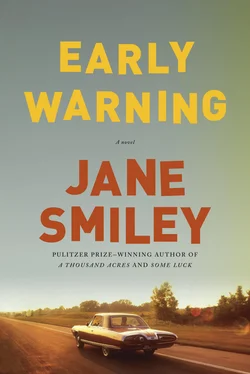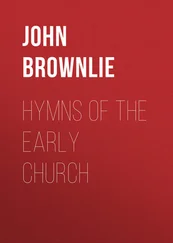Jane Smiley - Early Warning
Здесь есть возможность читать онлайн «Jane Smiley - Early Warning» весь текст электронной книги совершенно бесплатно (целиком полную версию без сокращений). В некоторых случаях можно слушать аудио, скачать через торрент в формате fb2 и присутствует краткое содержание. Год выпуска: 2015, Издательство: Knopf, Жанр: Современная проза, на английском языке. Описание произведения, (предисловие) а так же отзывы посетителей доступны на портале библиотеки ЛибКат.
- Название:Early Warning
- Автор:
- Издательство:Knopf
- Жанр:
- Год:2015
- ISBN:нет данных
- Рейтинг книги:5 / 5. Голосов: 1
-
Избранное:Добавить в избранное
- Отзывы:
-
Ваша оценка:
- 100
- 1
- 2
- 3
- 4
- 5
Early Warning: краткое содержание, описание и аннотация
Предлагаем к чтению аннотацию, описание, краткое содержание или предисловие (зависит от того, что написал сам автор книги «Early Warning»). Если вы не нашли необходимую информацию о книге — напишите в комментариях, мы постараемся отыскать её.
, a national best seller published to rave reviews from coast to coast.
Early Warning — читать онлайн бесплатно полную книгу (весь текст) целиком
Ниже представлен текст книги, разбитый по страницам. Система сохранения места последней прочитанной страницы, позволяет с удобством читать онлайн бесплатно книгу «Early Warning», без необходимости каждый раз заново искать на чём Вы остановились. Поставьте закладку, и сможете в любой момент перейти на страницу, на которой закончили чтение.
Интервал:
Закладка:
Ivy turned and looked at him. “Where’s Michael?”
“Watching for the ambulance.”
“I can feel hair.”
He said, “What?”
“I can feel the baby’s hair. There’s a lot of it. It’s right there.” Loretta’s head fell back and she groaned. Ivy said, “Oh, shit!” and leaned forward. Richie stepped into the bathroom and stood on his tiptoes. Loretta said, “Ohhhh Goddddd helppp meee!” and here it came, dark hair, dark squinched face, little crossed arms, little chest, first slowly and then shooting out, completely under the surface of the water, and therefore ripply and strange. Ivy half rose, leaned way over, and slipped her hands under the baby, back and shoulders and head; then, very carefully, sort of hooking her thumbs under its armpits, she lifted it out of the water, hair, forehead, nose, mouth, chin. The water sluiced over closed eyelids, plump cheeks, and full lips; then the mouth opened, silently. Then it let out a cry. Without being asked, Richie opened one of the towels and held it toward the baby. But there was a problem that they hadn’t foreseen. Richie and Ivy exchanged a look, and then Ivy leaned forward and bit the umbilical cord in two, spitting out a little blood. Richie wrapped the baby in the towel. It was tiny, much tinier than he had expected. He opened the towel again, just for a look, and said, “Boy.”
Now Loretta, who had seemed to pass out, her arms spread over the rim of the tub and her head dropped back, sat up. She said, “Is he okay?”
As if in answer, the baby opened his mouth again and wailed, a healthy and not painful sound. Ivy said, “He seems fine.” She pulled the plug. The red, bloody water began to drain away. When it was all gone, she laid another of the towels across Loretta’s thighs, and handed her the wrapped-up baby. Richie had to admit that he was sorry to give him up: he wasn’t the mother or the father, but somehow that tiny face, with the dark hair and the bowed lips, was imprinted on him. Moments later, Michael burst through the door, saying, “They’re here, they’re coming up!” And then he stood there, his eyes wide, his arms dangling at his sides. Richie said, “What’s his name?”
Michael and Loretta, both now staring at the tiny wrapped thing, said, simultaneously, “Chance.”
Ivy said, “You are naming this baby ‘Chance’?”
Michael took a deep breath. “Loretta’s grandfather was named Chance. Jonathan Chance. He was a cattle rustler.”
“He was not!” exclaimed Loretta. “He was a perfectly respectable businessman.” But she was grinning from ear to ear. She said, “Chance Markham Langdon. What a boy.”
Michael stepped forward, and Richie stepped back to make way. Moments later, a medic appeared in the doorway. He called out, “Looks like we’re too late again, Benny!”
—
IT WAS HOT. The worst winter Henry could remember (worse even than the winter of ’78, which drove him out of town), fifty-nine inches of snow, into April — his daffodils had worn snow hats for three days — had given way to the hottest summer. All he was doing lately was sitting around in his shorts, drinking ice water with lime juice and trying not to look at the thermometer. But how could he help himself? He had never seen it hit 108 before, much less for three days running. And at his place, he had a little bit of a breeze off the lake. He was almost ready to keep his air conditioner on all day, though so far he had limited himself to nights, spending at least some of the day at the Lee Street Beach, under an umbrella, where he was now, or in the water. He had also given himself express permission to do absolutely nothing. In his entire life, Henry could not remember doing nothing. His present exile in Chicago was his own fault, since he was the one who had talked Philip (they had resumed their relationship, but only as friends) and Philip’s current lover, Yves, who taught at the university in Rennes, into taking their little tour in June, to avoid the August crowds. Two young men escorting a fifty-year-old all over Cathar country, Narbonne to Béziers to Mazamet to Carcassonne, then Tarascon to Montségur, to Foix to Mirepoix, one slaughter after another, rolling fields and vineyards giving way to precipitous mountains and perfectly groomed beaches. Philip, whose specialty was structuralist criticism, and Yves, whose specialty was Baudelaire, had been genuinely shocked at Henry’s tales — Simon de Montfort slaughtering all the inhabitants of Béziers, even the Catholics who were seeking sanctuary in the cathedral, which he burned to the ground, saying, “Kill them all, God will recognize His own.” Subsequently, Simon’s head was smashed to bits by a stone catapulted from inside the walls of Toulouse by “ladies and girls and women.” A fitting end, they all thought. It was admittedly strange to drive through such a beautiful landscape and contemplate decades of religiously inspired cruelty and horror, but Henry had enjoyed himself.
He thought that Philip deserved someone like Yves. Philip was thirty-six now, tenured, published, often asked questions about incomprehensible subjects like semiotics and post-structuralism, which he answered with musical good nature. Metacriticism was much more glamorous than etymology, of course. Yves had reservations about Lacan and Saussure and approached Baudelaire with a more generalized perspective, situating him in his historical moment and cultural milieu, writing articles about the various ways in which Baudelaire and his contemporaries had infused this and that. Yves was twenty-nine, but well on his way from Rennes to Paris or Columbia. Henry was like an uncle to them (maybe a great-uncle to Yves), but they put up with him, and moderated the speed of their chatter in French so that Henry could understand most of what they said. The other thing Yves did was live in a large house between Rennes and Fougères. If you wanted medieval, you could hardly ask for anything more wonderful than the former frontier between Bretagne and France — with castles every few leagues — and then on down to Aquitaine, with its fortified hill towns, and below that, of course, Navarre, Ariège, Languedoc. His colleagues vacationed with their families on a continuum between Ottawa and Minneapolis; Henry flew off to Manhattan and Toulouse.
But he felt apocalyptic anyway, and it wasn’t only the heat and the contemplation of Pope Innocent III. One thing Philip and Yves had talked about as they drove around was what was happening to friends of theirs, strange lesions in their mouths, weird infections, night sweats, swollen glands. Henry had eavesdropped, only asking a question every so often. He knew, though, that as he talked about Pope Innocent III, who had sicced Simon de Montfort on the Cathars (who held unorthodox Gnostic and Manichean beliefs, didn’t give oaths, engage in marriage or reproduction, or eat meat), they were both wondering about curses, about such mysterious and medieval illnesses as the bloody flux, St. Anthony’s fire, St. Vitus’ dance, the ague, leprosy, the black death. Narbonne, Carcassonne, and Foix put them in the mood — God’s curse, bodies piled upon bodies, the sense of one citizen recoiling from another only to flee into the wilds and be eaten by wolves. Henry was sure that Philip’s and Yves’s residences had seemed as welcoming upon their return as his little duplex had to him.
Now, though, in the midst of all this heat and ennui, there was a name. Not the curse of God, but “acquired immunodeficiency syndrome,” every word easily sourced, three from Latin, one from Greek, a stiff, dry phrase, not medieval at all, but right up to date. Henry was falsely soothed by this phrase, somehow. It didn’t seem possible, now that he knew it, that he could go into the bathroom to brush his teeth, as he had a day or so after getting home from France, look in the mirror, see a blue lesion on his gum right above his incisors, and nearly jump out of his skin, practically dying of a heart attack before touching the bump and realizing it was a bit of a popcorn husk that he had carelessly missed when brushing his teeth the night before. He felt now that he could somehow review his own immune system, and establish in his own mind whether it was functioning up to capacity: Coughs? Two yesterday, three the day before. Sneezes? Only when confined in the same room with the air conditioner. Skin? No sores, no blemishes. Aches and pains? Nothing mysterious — a filling that needed to be replaced and an occasional migraine (thank God for the telltale flashes and halos). Bowel movements? Regular and consistent in every way.
Читать дальшеИнтервал:
Закладка:
Похожие книги на «Early Warning»
Представляем Вашему вниманию похожие книги на «Early Warning» списком для выбора. Мы отобрали схожую по названию и смыслу литературу в надежде предоставить читателям больше вариантов отыскать новые, интересные, ещё непрочитанные произведения.
Обсуждение, отзывы о книге «Early Warning» и просто собственные мнения читателей. Оставьте ваши комментарии, напишите, что Вы думаете о произведении, его смысле или главных героях. Укажите что конкретно понравилось, а что нет, и почему Вы так считаете.











